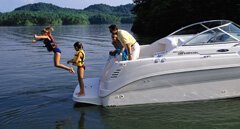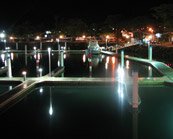The law requires fire extinguishers for most boats—a good idea, if there’s anything on your boat that could possibly burn.
Fire Classifications
- Class A: wood, cloth, paper, rubber, many plastics
- Class B: flammable liquids, oil, gasoline, alcohol, diesel fuel, paints
- Class C: Electrical fire, usually resulting from an overheated circuit or the arcing/sparking of energized electrical wires
Extinguishing Agents
- Water: good for Class A fires only
- Carbon Dioxide (CO2): Class B and C fires. Easy to use, no residue
- Dry Chemical: Class B and C fires only, not for Class A fires. The dry chemical leaves a powdery mess afterwards
- Aqueous Foam: Effective on Class A, B, and C fires
Extinguisher Locations
You should have fire extinguishers mounted where they’re easily accessible. Put a fire extinguisher near the engine, at the helm, in the galley, and in each cabin. The more fire extinguishers you have on board, the better your chances are of putting out a fire before it gets out of control.
Smoke Detectors
Installing a couple of smoke detectors in your boat can be a life-saving warning system should a fire ever occur. Having smoke detectors on your boat is especially important if you spend the night on board or keep your boat tied up at a marina, close to other boats. The humid marine environment might be hard on the smoke detectors’ batteries, so put new batteries in often.


